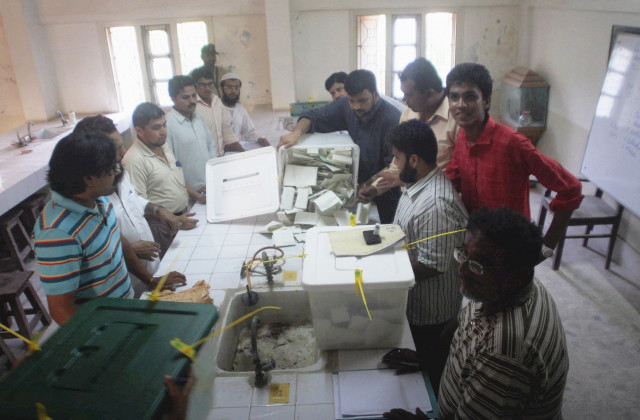Supreme Court imposes strict conditions for vote recount
RO must apply mind while before allowing a recounting, says a split verdict

Interpreting the legal provisions that allow recounting of votes during polls, the top court has imposed conditions on the returning officer (RO) – the official in each constituency who conducts an election and announces the result – and said the RO must apply mind while before allowing a recount.
"Provisions of Section 95(5) [of the Election Act 2017] can only be triggered after all the pre-conditions therein have been met and the contents of the request itself lend credence to the need for a recount.
“To ensure this, the RO must exercise his discretion and ascertain the reasonableness of the request and decide whether recounting is to take place in one or more polling stations, or not at all," said a written order authored by Justice Ijazul Ahsan.
A three-judge bench, comprising Justice Umar Ata Bandial, Justice Ahsan and Justice Munib Akhtar issued the split verdict on the appeal of a candidate – Mir Mujib-ur-Rehman Muhammad Hassani – who had requested for recounting of the votes cast in an entire constituency of the Balochistan Assembly.
The candidate, who contested from the provincial assembly constituency in July 2018 general election, had invoked Section 95(5) and (6) of the Elections Act, 2017. However, the court upheld the election tribunal’s order and rejected his request.
Section 95 (5) says before commencement of the consolidation proceedings, the RO shall recount the ballot papers of one or more polling stations if a request or challenge in writing is made by a contesting candidate or his election agent and the margin of victory is less than five percent of the total votes polled in the constituency or ten thousand votes, whichever is less, or the RO considers such request as not unreasonable: Provided that the recount shall be made by the RO only once"
The majority ruling noted that in order for the RO to order a recount under Section 95(5) three conditions must be fulfilled –filing of a written application, thin margin of victory and the request for recount being reasonable.
"Once all these conditions have been met, only then will an RO order a recount in one or more polling stations,” the majority verdict said.
It said a reasonable request must at least contain a narrative of the events that gave rise to the request in the first place, the details along with credible material/information regarding events that may have caused the contesting candidate to demand the recount together with the names and details of any individuals alleged to be involved, and the specific polling stations at which the recount is requested.
“Once all the afore-noted conditions have been met, then the RO must apply his mind to the facts and circumstances of the individual case and decide if, and in how many polling stations, a recount is warranted.”
The court, however, noted the law does not provide a criterion based upon which an RO may decide whether a particular application is not unreasonable.
"The exercise of recounting ballot papers for any number of polling stations is a tedious and time/resource-consuming task and it cannot be taken up indiscriminately, carelessly, without due application of mind and a tentative assessment of the material available on record, and in cases where only vague and general allegations and insinuations have been made.”
It said this exercise, which can potentially take months to complete, can arguably lead to the constituency remaining unrepresented for long periods of time, defeating the very purpose of the law and the concept of democratic representation.
“To this end, we are clear in our minds that even if a request has been made by a contesting candidate in an election where the threshold set by Section 95(5) is met, but the request itself does not specify any cogent reasons for the request along with identifying specific polling stations where the recount is being requested and giving credible materials/information, it would stand to reason that the RO should have the option/discretion to reject such a request."
The judgment said if this was not the case, we would have the absurd situation where at the request of an aggrieved candidate recounting takes place even at polling stations where the candidate in question has won or that without any allegation of rigging, corrupt and unlawful practices, and particulars based on which malpractices and rigging is being alleged, a candidate could still claim a recount by way of a record change and a fishing expedition simply showing that the margin of victory was less than five percent of the total votes polled in the constituency or ten thousand votes, whichever is less.
“If that were so, the phrase ‘or the RO considers such requests as not unreasonable would become redundant." The court said it is a settled law that no redundancy can be attributed to the legislature.
However, another member of the bench, Justice Munib Akhtar, disagreed with interpretation placed on Section 95(5) of the Elections Act, 2017. He noted that the majority judgment sets out in some detail the legislative policy that would result in the interpretation that finds favor with it.
"Again, with respect, I am unable to agree. In my view, to the extent that the legislative policy can at all be ascertained from the provisions, it points in the opposite direction.”
The judge said by altogether removing the RO’s discretion in a situation where the first condition applies, and restricting it to within a narrow ambit in relation to the second, the policy of the law appears to be to allow recounts to take place at the earliest stage.
"This is so to limit, if not altogether foreclose (that would, perhaps, be hoping too much), such challenges at a later stage, whether by way of an election petition under Article 225 (ie, in terms of the relevant election law) or constitutional petitions in the high courts or even this court."
He said the democratic principle is that once the people have spoken all other voices must fall silent.
"However, elections are, more often than not, strongly contested. Sometimes, after the heat and especially in the immediate aftermath of the contest, a losing candidate is unable to acknowledge that he has indeed lost, should respect the verdict of the people and wait for the next election cycle."
The judge noted that by allowing for recounts in terms as now contained in Section 95(5), the policy of the 2017 Act appears to be to allow for the “cooling off” to take place at an early stage.
"If as a consequence a little more time is required or taken to officially finalize matters, the law clearly regards that as time well spent." The judge said under the 1976 Act, the onus lay on the applicant to show that his request was reasonable.
Furthermore, even if, in law, it was, the use of the word “may” meant that the RO still retained discretion to nonetheless refuse a recount. Under the present law, the applicant must obviously, if he seeks recourse to the second condition, set out the reasons for seeking a recount.
An application in terms of the second condition without any reasons would be liable to be dismissed out of hand. However, if reasons are given then the onus lies on the RO – or the other contesting candidates – to first show that the request in unreasonable.
“It is here that the RO has discretion. If he concludes that the request is unreasonable, then the onus would shift on the applicant to show that this is not so. And if, in law, the applicant is correct, then the RO would have no further discretion.
“The word “shall” ensures that the recount must be ordered. Here, an interesting latent ambiguity in section 39(6) may be noted. The word “may” as used therein had, at least at first sight, appeared to control both clauses (a) and (b).
“But that would have meant that even if the Election Commission had ordered a recount the RO could have refused to do so. Obviously, such a conclusion would have been completely untenable.
“Thus, under the previous law the word “may” would have had to be read as such for the first clause, but as “shall” for by the second. The present law obviates any such difficulty by putting the power of the Election Commission [of Pakistan] in a separate subsection."
Justice Akhtar also noted that the majority judgment has concluded that the word “or”, where appearing in Section 95(5) is to be conjunctively.
"Thus, according to the majority view the subsection contemplates that a recount is to take place only if both the conditions, ie, “the margin of victory is less than five percent of the total votes polled in the constituency or ten thousand votes, whichever is less” and “the Returning Officer considers such request as not unreasonable” are fulfilled and applicable together.
"With respect, I am unable to agree. In my view, the word “or” is to be given its natural meaning and read disjunctively. In other words, the subsection contemplates two separate and distinct conditions, and a recount is permissible if either one of them is met," he further noted.
Lawyer Umer Gilani said it was argued before the Supreme Court that under Section 95(6) of the Elections Act, 2017, the scope of recounting has been expanded.
“Every losing candidate is entitled to get a recount, provided that the margin of victory is small. It was argued that in such cases, the RO has no discretion. He or she must do a recount.
“The majority judgment held that regardless of how small the margin of victory might be, the RO retains discretion and he must apply his mind,” he said.
He said the dissenting judge, Justice Munib Akhatar, has pointed out that this interpretation is grammatically impossible. “The text of Section 95(6) doesn't allow for it. In small-margin cases, an application for recount has to be allowed,” he added.



















COMMENTS
Comments are moderated and generally will be posted if they are on-topic and not abusive.
For more information, please see our Comments FAQ